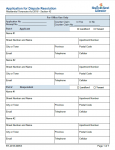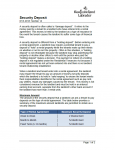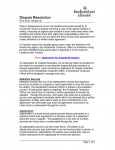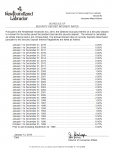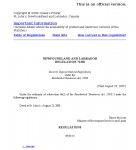When moving into a new rental unit in Newfoundland and Labrador the landlord can only ask for the first month of rent to be paid, plus a security deposit. A landlord cannot ask for rent to be paid for the “first and last” months.
Landlords are required by law to provide tenants with a written receipt for amounts paid as a security deposit. The receipt should state the date the deposit was paid, the amount of the deposit, and the address of the rental unit for which it was collected.
Maximum Amount
The maximum amount a landlord is permitted to collect as a security deposit from a tenant is 75% of the monthly rent amount when the tenant has signed a fixed-term rental agreement or is renting from month to month.
The maximum amount a landlord is permitted to collect as a security deposit from a tenant that is renting week to week is equal to two weekly rent payments.
Overpayment
If a landlord collects more than the maximum amount permitted for a security deposit the tenant may put the difference towards their next rent payment and does NOT need permission from the landlord to do so.
For example, if the monthly rent amount is $750 the maximum amount permitted for a security deposit would be $562.50. In this case if the landlord required the tenant to pay $600 for a security deposit that would be an over-payment of $37.50. The tenant would be able to put that $37.50 towards their next rent payment, so the next time rent was due they would only need to pay $712.50.
Money to be Held in Trust
When a landlord obtains a security deposit from a tenant, they are supposed to deposit the money into an interest-bearing account within two banking days. If a landlord has three or more rental units, they must deposit the money into a trust account, used only for holding security deposits. The security deposit does NOT belong to the landlord and should NOT be used except in accordance with the Residential Tenancies Act.
When a Tenancy Ends
Within ten days of the tenant moving out of the rental unit the landlord should return the security deposit to the tenant, unless the landlord has filed a claim with Service NL. A tenant can also agree in writing to permit the landlord to keep any portion of the security deposit.
If the landlord has not either returned the security deposit, or filed a claim with Service NL, within ten days of the rental agreement being terminated the tenant can file their own claim with Service NL to determine what will happen with the security deposit.
Once a tenant files a claim with Service NL for the return of a security deposit, the landlord has ten days from the date they are served with a copy of the tenant’s application to file a counterclaim if they believe they are entitled to keep any portion of the security deposit. If a landlord does not file a counterclaim within that ten-day period Service NL may order the landlord to return the security deposit to the tenant without holding a hearing on the matter.


